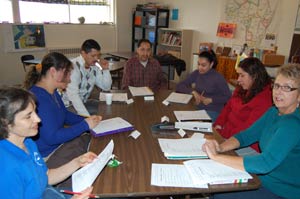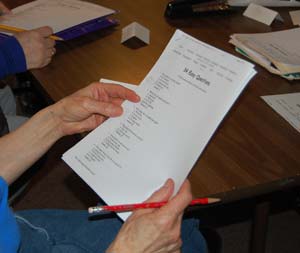MILWAUKEE — According to a Chinese proverb, there are two ways to help a fellow human being: You can either give him a fish to feed him for a day, or teach him to fish, which will  ABOVE: Students gather for a recent English as a Second Language class in their classroom at Prince of Peace Church, Milwaukee. Pictured, clockwise beginning at left, are Carmen González, Felícitas Hernández, Manuel Elicerio, Angel López, Cecilia Flores, Maria Salinas and teacher, Nancy Turner. (Catholic Herald photos by Amy Taylor)
ABOVE: Students gather for a recent English as a Second Language class in their classroom at Prince of Peace Church, Milwaukee. Pictured, clockwise beginning at left, are Carmen González, Felícitas Hernández, Manuel Elicerio, Angel López, Cecilia Flores, Maria Salinas and teacher, Nancy Turner. (Catholic Herald photos by Amy Taylor)
BELOW: Student, Carmen González, completes a worksheet during a March ESL class at Prince of Peace Church, Milwaukee.allow him to eat for a lifetime. The parishioners of Prince of Peace/Principe de Paz Parish have chosen the latter part of the proverb to help immigrants in their community become citizens of the United States, by teaching them English through the use of informal classes.
When Fr. Martí Colom saw the needs of his Spanish-speaking parish members of St. Matthew, Milwaukee (now Prince of Peace/Principe de Paz), in 2001, he knew he had to do something to help immigrants gain the tools they needed to become United States citizens. He enlisted parishioner and Milwaukee Public School teacher Maria Torres to help him conduct classes in English.
“If they need to finish school, or take English classes, he said we had to start doing something,” she remembered. “I was always very close with whatever priest would come (to the parish), and I started working with him.”
Fr. Colom and Torres implemented a GED and an English as a Second Language (ESL) class. Announcements at Mass and volunteer sign-up sheets invited parishioners to help on a very informal basis, according to Torres. Afterward, Fr. Colom was moved to a different parish, and another priest took his place and the classes continued, with Torres helping with the ESL classes. What started as a small class to prepare people for GED certification, is today a twice weekly GED class and ESL program that helps more than 50 people improve their lives.
informal basis, according to Torres. Afterward, Fr. Colom was moved to a different parish, and another priest took his place and the classes continued, with Torres helping with the ESL classes. What started as a small class to prepare people for GED certification, is today a twice weekly GED class and ESL program that helps more than 50 people improve their lives.
“When we teach or help somebody else, you give them a power,” Torres explained while sitting in her cheerful but crowded lower classroom in the parish’s school. “A power of themselves, a power to help others. Because I am a Christian, because I am a Catholic, and the Catholics say we need to help our brother and sister.
“We are making here a community, that’s the great thing here,” she added.
Although their curriculum could use a face-lift – they are always in need of language books and worksheets for introductory and intermediate students – Torres is grateful for anything that is donated for their makeshift classrooms, whether it be notebooks and pencils, reams of paper, markers for the white board or even coffee.
Tom and Nancy Turner have volunteered teaching English to Torres’ students each Saturday morning for the past six years. The couple from St. John Vianney Parish, Brookfield, say that by helping just a little in the lives of immigrants seeking help from the church, they have themselves learned much.
“It’s probably been more rewarding for us than for the students,” Nancy explained. “You really find what wonderful people they are. You know, we’re in a white suburb, and you come down here and you think, people are the same all over. They’re just trying to get ahead and do better and learn English.”
Tom has discovered that there are a lot of outside resources he can use to help prepare weekly lesson plans.
“There’s a lot of websites for English as a Second Language,” he said. “I’m doing a vocabulary thing and we go through that (website) as an example of one of the things that we’re doing now, and it’s good for them because they can learn new words and what they mean and all that. They have a wealth of stuff out there.
“If you put yourself in a position where you were going to move to a country where you didn’t speak the language, and then you had to get a job and support a family and all that, think about how hard that would be,” Tom added. “So, I just think if we can help these people – they’re here and they’re not going anywhere – anything we can do to help them assimilate and to help them prepare for a life here is worthwhile.”
Want to volunteer?Those interested in volunteering or donating workbooks or school supplies should contact Maria Torres at (414) 645-8786 or email: torres.maria98@gmail.com. |
“This is part of my life,” Torres explained. “Even though it’s not a paying job, it’s my job to be here….
“Somebody has to do it,” she said. “If it helps someone – at least a person – I feel good. I feel good about myself because I helped someone. This is one of the things that I always do, and they – the volunteers – keep me motivated because I have people to help me out.” Torres realized that three years ago, when the weight of taking care of and scheduling all the classes was too much for her. After asking for help, she received numerous phone calls from people willing to donate their time.
“That’s when I realized that this is not my thing, this is God’s thing,” she remembered. “It’s not because of me, it’s because God wanted me to do something for somebody.”
Felipe Sanchez, 34, has attended the ESL classes at the parish for a number of years, and has worked with many people who volunteer in the classroom. According to Sanchez, the variety is a good thing.
“I notice that every person has a different pronunciation,” he explained. “I’m learning to practice different sounds or words, different meanings, because every person is given sometimes different meanings – they understand the words.
“I like to be coming here, to be learning more,” he said. “I was growing up in Mexico, in Guadalajara. I was coming to the United States since 1997, but I was returning to Mexico because I was a student in Mexico. I was coming and returning, and was completely living here for five years, more or less. I was studying to be an engineer, mechanical/electrical engineer, and I was doing my process here at UW-Milwaukee.
“Like Felipe, he’s one of the faithful students,” Torres said, explaining that he attained his citizenship as a result of taking their classes. “I thought that he was going to stop there, but no. He keeps coming both days.”
